#Neil Gaiman's the Sandman Fan fiction
Explore tagged Tumblr posts
Text
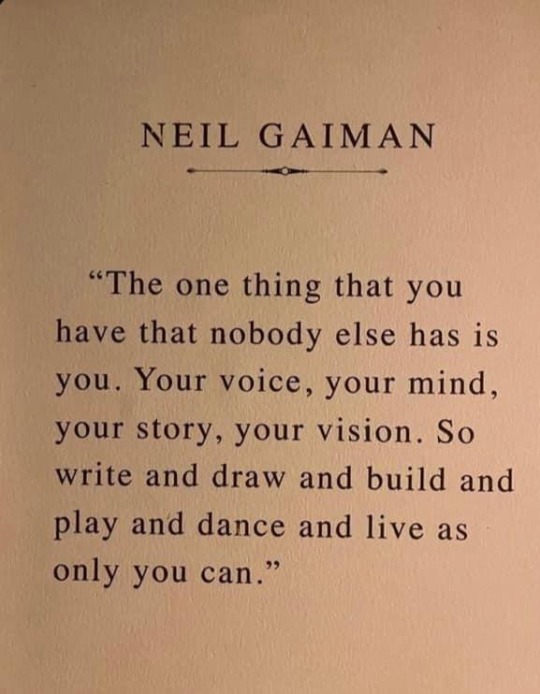
#neil gaiman#writing advice#drawing#good omens fan fiction#good omens fanwork#good omens fanart#ao3 writer#the sandman
86 notes
·
View notes
Text
How Michael Met Neil
original direct link [MP3]
(Neil, if you see this, please feel free to grab the transcript and store on your site; I had no easy way of contacting you.)
DAVID TENNANT: Tell me about @neil-gaiman then, because he's in that category [previously: “such a profound effect on my life”] as well.
MICHAEL SHEEN: So this is what has brought us together.
DAVID: Yes.
MICHAEL: To the new love story for the 21st century.
DAVID: Exactly.
MICHAEL: So when I went to drama school, there was a guy called Gary Turner in my year. And within the first few weeks, we were doing something, having a drink or whatever. And he said to me, “Do you read comic books?”
And I said, “No.” I mean, this is … what … '88? '88, '89. So it was … now I know that it was a period of time that was a big change, transformation going through comic books. Rather than it being thought of as just superheroes and Batman and Superman, there was this whole new era of a generation of writers like Grant Morrison.
DAVID: The kids who'd grown up reading comic books were now making comic books
MICHAEL: Yeah, yeah, and starting to address different kinds of subjects through the comic book medium. So it wasn't about just superheroes, it was all kinds of stuff going on – really fascinating stuff. And I was totally unaware of this.
And so this guy Gary said to me, "Do you read them?" And I said, "No." And he went, "Right, okay, here's The Watchman [sic] by Alan Moore. Here's Swamp Thing. Here's Hellblazer. And here's Sandman.”
And Sandman was Neil Gaiman's big series that put his name on the map. And I read all those, and, just – I was blown away by all of them, but particularly the Sandman stories, because he was drawing on mythology, which was something I was really interested in, and fairy tales, folklore, and philosophy, and Shakespeare, and all kinds of stuff were being mixed up in this story. And I absolutely loved it.
So I became a big fan of Neil's, and started reading everything by him. And then fairly shortly after that, within six months to a year, Good Omens the book came out, which Neil wrote with Terry Pratchett. And so I got the book – because I was obviously a big fan of Neil's by this point – read it, loved it, then started reading Terry Pratchett’s stuff as well, because I didn't know his stuff before then – and then spent years and years and years just being a huge fan of both of them.
And then eventually when – I'd done films like the Underworld films and doing Twilight films. And I think it was one of the Twilight films, there was a lot of very snooty interviews that happened where people who considered themselves well above talking about things like Twilight were having to interview me … and, weirdly, coming at it from the attitude of 'clearly this is below you as well' … weirdly thinking I'm gonna go, 'Yeah, fucking Twilight.”
And I just used to go, "You know what? Some of the greatest writing of the last 50-100 years has happened in science fiction or fantasy." Philip K Dick is one of my favorite writers of all time. In fact, the production of Hamlet I did was mainly influenced by Philip K Dick. Ursula K. Le Guin and Asimov, and all these amazing people. And I talked about Neil as well. And so I went off on a bit of a rant in this interview.
Anyway, the interview came out about six months later, maybe. Knock on the door, open the door, delivery of a big box. That’s interesting. Open the box, there's a card at the top of the box. I open the card.
It says, From one fan to another, Neil Gaiman. And inside the box are first editions of Neil's stuff, and all kinds of interesting things by Neil. And he just sent this stuff.
DAVID: You'd never met him?
MICHAEL: Never met him. He'd read the interview, or someone had let him know about this interview where I'd sung his praises and stood up for him and the people who work within that sort of genre as being like …
And he just got in touch. We met up for the first time when he came to – I was in Los Angeles at the time, and he came to LA. And he said, "I'll take you for a meal."
I said, “All right.”
He said, "Do you want to go somewhere posh, or somewhere interesting?”
I said, "Let's go somewhere interesting."
He said, "Right, I'm going to take you to this restaurant called The Hump." And it's at Santa Monica Airport. And it's a sushi restaurant.
I was like, “Right, okay.” So I had a Mini at the time. And we get in my Mini and we drive off to Santa Monica Airport. And this restaurant was right on the tarmac, like, you could sit in the restaurant (there's nobody else there when we got there, we got there quite early) and you're watching the planes landing on Santa Monica Airport. It's extraordinary.
And the chef comes out and Neil says, "Just bring us whatever you want. Chef's choice."
So, I'd never really eaten sushi before. So we sit there; we had this incredible meal where they keep bringing these dishes out and they say, “This is [blah, blah, blah]. Just use a little bit of soy sauce or whatever.” You know, “This is eel. This is [blah].”
And then there was this one dish where they brought out and they didn't say what it was. It was like “mystery dish”, we had it ... delicious. Anyway, a few more people started coming into the restaurant as time went on.
And we're sort of getting near the end, and I said, "Neil, I can't eat anymore. I'm gonna have to stop now. This is great, but I can't eat–"
"Right, okay. We'll ask for the bill in a minute."
And then the door opens and some very official people come in. And it was the Feds. And the Feds came in, and we knew they were because they had jackets on that said they were part of the Federal Bureau of Whatever. And about six of them come in. Two of them go … one goes behind the counter, two go into the kitchen, one goes to the back. They've all got like guns on and stuff.
And me and Neil are like, "What on Earth is going on?"
And then eventually one guy goes, "Ladies and gentlemen, if you haven't ordered already, please leave. If you're still eating your meal, please finish up, pay your bill, leave."*
[* - delivered in a perfect American ‘serious law agent’ accent/impression]
And we were like, "Oh my God, are we poisoned? Is there some terrible thing that's happened?"
We'd finished, so we pay our bill. And then all the kitchen staff are brought out. And the head chef is there. The guy who's been bringing us this food. And he's in tears. And he says to Neil, "I'm so sorry." He apologizes to Neil. And we leave. We have no idea what happened.
DAVID: But you're assuming it's the mystery dish.
MICHAEL: Well, we're assuming that we can't be going to – we can't be – it can't be poisonous. You know what I mean? It can't be that there's terrible, terrible things.
So the next day was the Oscars, which is why Neil was in town. Because Coraline had been nominated for an Oscar. Best documentary that year was won by The Cove, which was by a team of people who had come across dolphins being killed, I think.
Turns out, what was happening at this restaurant was that they were having illegal endangered species flown in to the airport, and then being brought around the back of the restaurant into the kitchen.
We had eaten whale – endangered species whale. That was the mystery dish that they didn't say what it was.
And the team behind The Cove were behind this sting, and they took them down that night whilst we were there.
DAVID: That’s extraordinary.
MICHAEL: And we didn't find this out for months. So for months, me and Neil were like, "Have you worked anything out yet? Have you heard anything?"
"No, I haven't heard anything."
And then we heard that it was something to do with The Cove, and then we eventually found out that that restaurant, they were all arrested. The restaurant was shut down. And it was because of that. And we'd eaten whale that night.
DAVID: And that was your first meeting with Neil Gaiman.
MICHAEL: That was my first meeting. And also in the drive home that night from that restaurant, he said, and we were in my Mini, he said, "Have you found the secret compartment?"
I said, "What are you talking about?" It's such a Neil Gaiman thing to say.
DAVID: Isn't it?
MICHAEL: The secret compartment? Yeah. Each Mini has got a secret compartment. I said, "I had no idea." It's secret. And he pressed a little button and a thing opened up. And it was a secret compartment in my own car that Neil Gaiman showed me.
DAVID: Was there anything inside it?
MICHAEL: Yeah, there was a little man. And he jumped out and went, "Hello!" No, there was nothing in there. There was afterwards because I started putting...
DAVID: Sure. That's a very Neil Gaiman story. All of that is such a Neil Gaiman story.
MICHAEL: That's how it began. Yeah.
DAVID: And then he came to offer you the part in Good Omens.
MICHAEL: Yeah. Well, we became friends and we would whenever he was in town, we would meet up and yeah, and then eventually he started, he said, "You know, I'm working on an adaptation of Good Omens." And I can remember at one point Terry Gilliam was going to maybe make a film of it. And I remember being there with Neil and Terry when they were talking about it. And...
DAVID: Were you involved at that point?
MICHAEL: No, no, I wasn't involved. I just happened to have met up with Neil that day.
DAVID: Right.
MICHAEL: And then Terry Gilliam came along and they were chatting, that was the day they were talking about that or whatever.
And then eventually he sent me one of the scripts for an early draft of like the first episode of Good Omens. And he said – and we started talking about me being involved in it, doing it – he said, “Would you be interested?” I was like, "Yeah, of course." I went, "Oh my God." And he said, "Well, I'll send you the scripts when they come," and I would read them, and we'd talk about them a little bit. And so I was involved.
But it was always at that point with the idea, because he'd always said about playing Crowley in it. And so, as time went on, as I was reading the scripts, I was thinking, "I don't think I can play Crowley. I don't think I'm going to be able to do it." And I started to get a bit nervous because I thought, “I don't want to tell Neil that I don't think I can do this.” But I just felt like I don't think I can play Crowley.
DAVID: Of course you can [play Crowley?].
MICHAEL: Well, I just on a sort of, on a gut level, sometimes you have it on a gut level.
DAVID: Sure, sure.
MICHAEL: I can do this.
DAVID: Yeah.
MICHAEL: Or I can't do this. And I just thought, “You know what, this is not the part for me. The other part is better for me, I think. I think I can do that, I don't think I could do that.”
But I was scared to tell Neil because I thought, "Well, he wants me to play Crowley" – and then it turned out he had been feeling the same way as well. And he hadn't wanted to mention it to me, but he was like, "I think Michael should really play Aziraphale."
And neither of us would bring it up. And then eventually we did. And it was one of those things where you go, "Oh, thank God you said that. I feel exactly the same way." And then I think within a fairly short space of time, he said, “I think we've got … David Tennant … for Crowley.” And we both got very excited about that.
And then all these extraordinary people started to join in. And then, and then off we went.
DAVID: That's the other thing about Neil, he collects people, doesn't he? So he'll just go, “Oh, yeah, I've phoned up Frances McDormand, she's up for it.” Yeah. You're, what?
MICHAEL: “I emailed Jon Hamm.”
DAVID: Yeah.
MICHAEL: And yeah, and you realize how beloved he is and how beloved his work is. And I think we would both recognise that Good Omens is one of the most beloved of all of Neil's stuff.
DAVID: Yes.
MICHAEL: And had never been turned into anything.
DAVID: Yeah.
MICHAEL: And so the kind of responsibility of that, I mean, for me, for someone who has been a fan of him and a fan of the book for so long, I can empathize with all the fans out there who are like, “Oh, they better not fuck this up.”
DAVID: Yes.
MICHAEL: “And this had better be good.” And I have that part of me. But then, of course, the other part of me is like, “But I'm the one who might be fucking it up.”
DAVID: Yeah.
MICHAEL: So I feel that responsibility as well.
DAVID: But we have Neil on site.
MICHAEL: Yes. Well, Neil being the showrunner …
DAVID: Yeah. I think it takes the curse off.
MICHAEL: … I think it made a massive difference, didn't it? Yeah. You feel like you're in safe hands.
DAVID: Well, we think. Not that the world has seen it yet.
MICHAEL (grimly): No, I know.
DAVID: But it was a -- it's been a -- it's been a joy to work with you on it. I can't wait for the world to see it.
MICHAEL: Oh my God. Oh, well, I mean, it's the only, I've done a few things where there are two people, it's a bit of a double act, like Frost-Nixon and The Queen, I suppose, in some ways. But, and I've done it, Amadeus or whatever.
This is the only thing I've done where I really don't think of it as “my character” or “my performance as that character”. I think of it totally as us.
DAVID: Yeah.
MICHAEL: The two of us.
DAVID: Yes.
MICHAEL: Like they, what I do is defined by what you do.
DAVID: Yeah.
MICHAEL: And that was such a joy to have that experience. And it made it so much easier in a way as well, I found, because you don't feel like you're on your own in it. Like it's totally us together doing this and the two characters totally complement each other. And the experience of doing it was just a real joy.
DAVID: Yeah. Well, I hope the world is as excited to see it as we are to talk about it, frankly.
MICHAEL: You know, there's, having talked about T.S. Eliot earlier, there's another bit from The Wasteland where there's a line which goes, These fragments I have shored against my ruin.
And this is how I think about life now. There is so much in life, no matter what your circumstances, no matter what, where you've got, what you've done, how much money you got, all that. Life's hard. I mean, you can, it can take you down at any point.
You have to find this stuff. You have to like find things that will, these fragments that you hold to yourself, they become like a liferaft, and especially as time goes on, I think, as I've got older, I've realized it is a thin line between surviving this life and going under.
And the things that keep you afloat are these fragments, these things that are meaningful to you and what's meaningful to you will be not-meaningful to someone else, you know. But whatever it is that matters to you, it doesn't matter what it was you were into when you were a teenager, a kid, it doesn't matter what it is. Go and find them, and find some way to hold them close to you.
Make it, go and get it. Because those are the things that keep you afloat. They really are. Like doing that with him or whatever it is, these are the fragments that have shored against my ruin. Absolutely.
DAVID: That's lovely. Michael, thank you so much.
MICHAEL: Thank you.
DAVID: For talking today and for being here.
MICHAEL: Oh, it's a pleasure. Thank you.
#neil gaiman#michael sheen#david tennant does a podcast with...#good omens#aziraphale#crowley#sushi#whale#the cove#oscars 2010#coraline#mini secret compartments#howneilmetmichael#howmichaelmetneil
5K notes
·
View notes
Text
I do have one thing and one thing only to say about the Neil Gaiman revelations.
Others more articulate than I have gone into detail on the horror of it. It should go without saying that fans across every fandom linked to him are horrified and each dealing with the revelations in their own way. My thoughts below may seem, I don't know, pithy in response but I'm not trying to address the enormity of what happened or offer any sort of solution, or comfort, or anything but my own confusion on a particular, perhaps even silly point. This is just my own moment to grapple with an aspect of the revelation that just won't get out of my head.
Here's a thing I don't get. It's a stupid thing, even ridiculous, but it haunts me:
Why remake the comic issue "Calliope" in the Sandman show? If you're N.G. and you know what you've done?? How could you be so fucking stupid? Or is it pure hubris? Why in the world would you update it so Madoc bore more similarities to current N.G., with such similar crimes of hypocrisy, using progressiveness as a mask over such crimes of sexual abuse?? Why wouldn't you try to distract or at least not bring such direct parallel attention to what you've done in your own story??
Writing Calliope in the first place as a younger man is one thing. The Sandman comic is edgy and dark and a story like that fits the 90s era grimdark tone. And many accounts seem to point to him not having committed any of those crimes back when he wrote Calliope. His ability to commit and get away with such abuse, perhaps even his interest in doing so I don't fucking know, came later, once he had money and power and influence. Sure, take that as you will, I don't claim to know, but most of the accounts seem to be from after he was 40 and he wrote Calliope long before that.
But the Calliope update in the Sandman show so specifically seems to draw parallels between Madoc and Gaiman. Like, there's a whole bit about how Madoc wants any shows or movies based in his work to have at least half women and people of color, Madoc is posing himself as this progressive feminist and the disgusting hypocrisy of it of course is that he has a woman he's abusing locked up in the attic.
I remember watching that scene, while watching this remake of Sandman that is, of course, more than half women and people of color. One of the biggest dudebro complaints against the Sandman show was that Lucienne got genderswapped and Death was played by a black woman. Like, you're watching the show where the acclaimed author's works are getting a progressive facelift, in the episode, with a fictional author, who is demanding the progressive facelift for film versions of his work, while he's being a vile predatory hypocrite with a woman locked in the attick.
I remember watching that scene and thinking, astounded and rather anxious for him, "My god, Neil must have absolute ironclad certainty that he has never done anything that can be construed as sexually inappropriate if he's making this update to the characters with parallels that could so clearly apply to him as well! He must be totally wholesome, faithful to his wife, and careful around fans. He must be 100% dead certain that he is above reproach because even a whisper, a false accusation of impropriety, one unhappy fan at an event, could make this episode look like the rankest hypocrisy. Why would you ever dare remake Calliope, and remake it so specifically to model after Neil, if you're Neil, unless you're 1000% certain Madoc's update doesn't apply to you at all?"
Like, even the most squeaky clean person in the world has gotta hesitate a bit when drawing a potential parallel between themselves as the author of the work and a villain in the work, and saying "This is me if I was a bad person." RIGHT? Like you've gotta have a moment's hesitation, even if you know none of it is true, before you dare risk drawing such parallels and literally updating the work into the script to make it more like you. Even if you know you've never done anything wrong in your life as an author, when you create Madoc, who is an author, who voices similar views to things you've said, you've gotta have a moment's hesitation just in case people misconstrue that the other villainous stuff applies to you too, right?
I think there's a part of me that like... understands obviously that there's evil in the world but sometimes what makes me additionally angry is when evil is stupid? Like when really obvious fraud is committed, or when the coverup is just really blatantly false. And this kind of falls into that category of like, what were you thinking drawing attention to your own potential abuse of power with fans, how your own progressive ideals could be rank hypocrisy over a mask of horror, that you could be saying all these feminist things while keeping a woman locked up and assaulted in your attic, almost literally, why would you even dare put that-- I mean, I daresay, confession out into the world and make the parallels so obvious, to actually update the parallels to be more like you now! Why would you dare do that?!
I can only imagine two answers:
It wasn't Neil. It was the other show creators who came up with the idea, because they truly thought Neil was above reproach (or maybe they did know some element of the truth and it WAS a warning but that feels less likely with him as executive producer that he'd let that in) and he couldn't cut it from the story without raising questions about why he wanted this rather salient update to the character removed without raising questions, especially if Orpheus & Calliope plot was going to a big thing later in the story.
It was Neil's choice to put that update in and it is some sort of twisted confession or he didn't see the parallels or he truly didn't think anyone would spot it or know?? But again WHY make Madoc progressive in such a specifically similar way to Neil?! Madoc didn't need to be progressive! He didn't need to say his films should be adapted to be more diverse the same way Neil did, in a show that was adapted to be more diverse! You didn't need to make the parallels to Neil so goddamn glaring, you could just adapt it directly to the comic and avoid the possible parallel! Why risk it??
It's a stupid thing to get stuck on, I know. But it baffles me, the sheer... hubris of it? The foolishness? I can't control what happened, I can't help the victims, and many fans are grappling with many questions about this but still, holy shit...
Why update Calliope with a Madoc that is so much like Neil, knowing as Neil did how deep the parallels actually went? Why, in the fucking world, would you ever fucking do that??
#neil gaiman#likely my only word on the subject ever again#trigger warnings for the content discussed#but like if you're following this story at all you kinda know what's going to be discussed and there's no graphic detail
141 notes
·
View notes
Text
Harry Potter hot take
I do not actually give a shit if you like Harry Potter or if you have a Hogwarts house in your bio.
I don't care if you make a show of not liking Harry Potter anymore - that is quite literal definition of virtue signalling.
What IS important that you don't support official releases. Pirate all of it. If you buy Harry Potter lego, buy bootlegs. If you play Hogwarts Legacy, play the pirated version. If you play those mobile games, play the cracked APK without microtransactions.
Purity politics in this regard are idiotic - it's easy to tell someone to not read Harry Potter, but now that we know that Neil Gaiman is a serial rapist - are you gonna tell people to not read Sandman or Good Omens? And how far does it go? Of classic fantasy and sci-fi authors, significant chunk were racist or sexist. Like, are you gonna tell people to not watch Star Trek because Shatner became a MAGA chud?
Just like material conditions are important, so are material actions. Consuming media isn't that important as long as you approach it critically, but material support is.
If terrible people will be enriched by supporting official release of the material... don't buy it. Gaiman gets royalties for adaptations of his books and comics, so don't buy them. Don't buy Harry Potter licensed stuff, because so does JKR. If you really need something physical , buy it second hand or fan-made.
But Shatner gets basically nothing from supporting modern Star Trek material, or Notch gets nothing by you buying Minecraft... so it doesn't matter if you do or not.
"But Harry Potter is racist -" significant chunk of works out there are either sexist or racist or something-ist. Consuming only 'ideologically pure' fiction is a terrible idea that will leave you consuming only fanfics and children's media - and then writing long essays about why certain fanfics or cartoons are irredeemable trash. And we just saw in recent years where that leads, right?
"So what, does that mean I should read Mein Kampf?" People DO read Mein Kampf for historical analysis. The question is why do you want to do that, and second part is keeping a critical mind to notice when writer is trying to influence you. Reading 'bad books' will not magically make you a worse person, and you're much more likely to be influenced by propaganda that you DON'T already know is bad.
Instead, try to focus on caring and supporting groups that are harmed by these authors. Instead of making a big show of not reading Sandman, support women and victims of sexual violence. Instead of posturing about how you don't read Harry Potter, support trans people.
#harry potter#hp fandom#harry potter series#bookblr#comic books#comics#neil gaiman#good omens#gomens#-
52 notes
·
View notes
Text
I see dead people and they are in the form of teenagers Edwin Payne and Charles Rowland killed in 1916 and 1989, respectively.

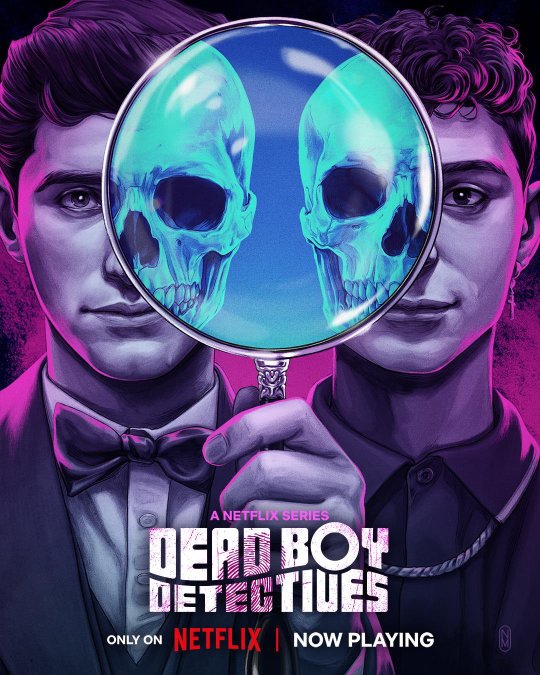
Yes, all eight episodes (too few episodes, I say. A good 13 eps would have been fitting) of DEAD BOY DETECTIVES is available on Netflix.
Series stars George Rexstrew (Edwin), Kassius Nelson (Crystal Palace), Yuyu Kitamura (Niko Sasaki) and Jayden Revri (Charles Rowland)
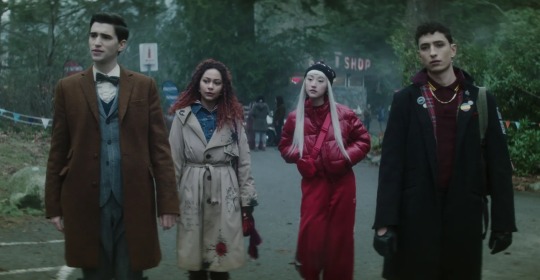
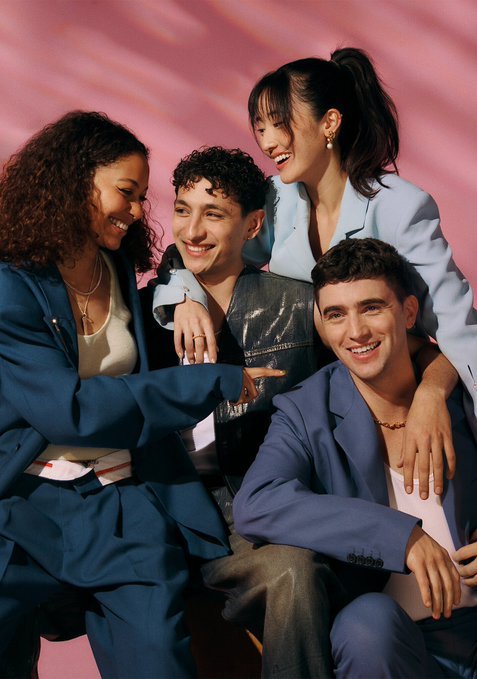
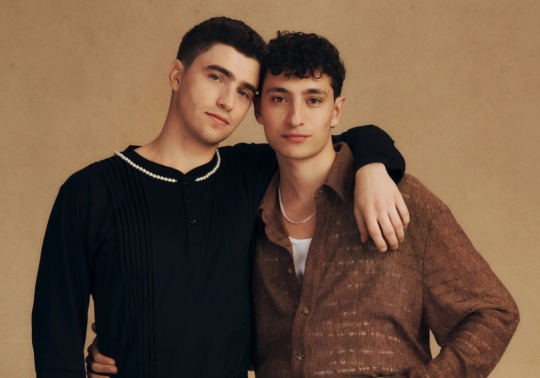
A bit about the series:
NO SPOILERS
Born out of DC Comics' Vertigo imprint and created by Neil Gaiman with its characters being spun out of the Sandman universe, how divergent is the series from the comics?Not very. They have retained the trio's backstories, but there were story arcs they could not delve into because Netflix's SANDMAN needs to get there first. Other than that, things are twists on canon or new creations.
Of the characters themselves, Neil Gaiman has said Charles was "more or less him" as a boy and in crafting the series characters, the costumes lent a hand. With his buttoned-up attitude, the bespoked suits for Edwin Paine belies his closed off demeanor. Jayden Revri's Charles Rowland had a ska/rude boy looked that was of fashion when he was alive. This was a nod that Revri appreciated as he has explained in the past he's, "half Indian, a quarter Jamaican and a quarter English." Charles also always has red on him as a nod to comics!Charles' red sweater.
While the characters were first introduced in HBO Max's DOOM PATROL, once the plans for a series was announced, it was quickly let known that this incarnation is not in the same universe as DOOM PATROL's characters, despite DOOM PATROL's Ruth Connell reprising her role as Night Nurse in the Netflix series. This series is firmly in the Sandman universe with Kirby (formerly Kirby Howell-Baptiste, briefly reprising her role as Death in the first episode.
Should DEAD BOY DETECTIVES get a second series, Rexstrew and Lukas Gage (who plays Cat King)
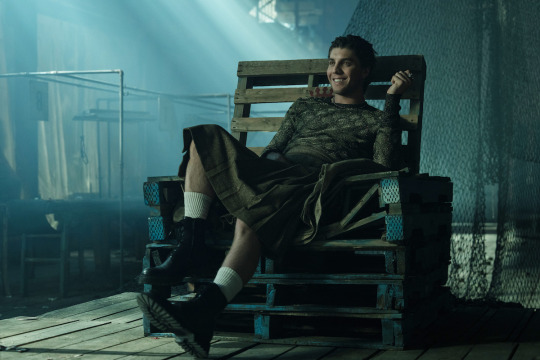
have already spoken of their love of Mason Alexander Park's character Desire from the series, with Rexstrew saying he would love to see Edwin's reaction to Desire.
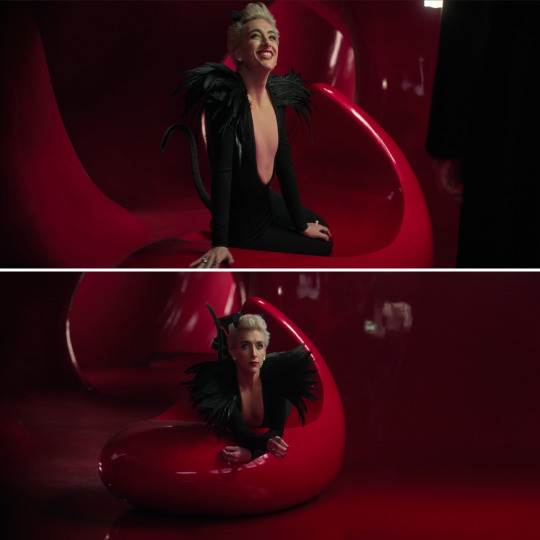
There's no malewife like him.
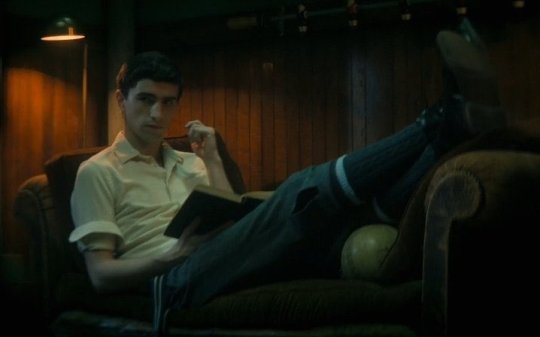
Other cast members include Briana Cucuo, sister of BIG BANG THEORY's Kaley Cucuo. Briana voices Barbara Gordon and a sundry of other characters on Max's HARLEY QUINN.
Much too hot to be doing voice-work.
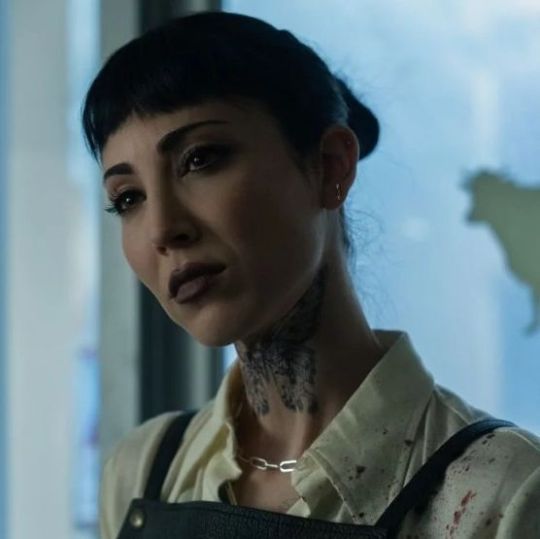
Jenn Lyon (Claws), Joshua Colley (Love, Victor) and Max Jenkins and Caitlin Reilly cutting it up in a (literal) small role.
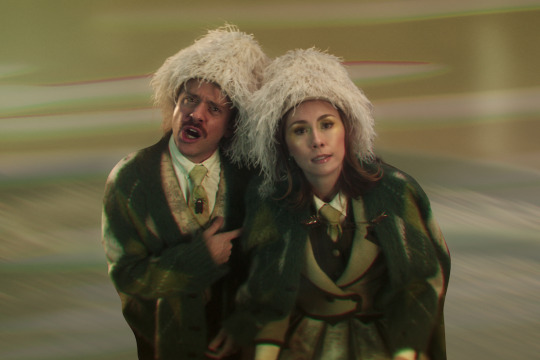
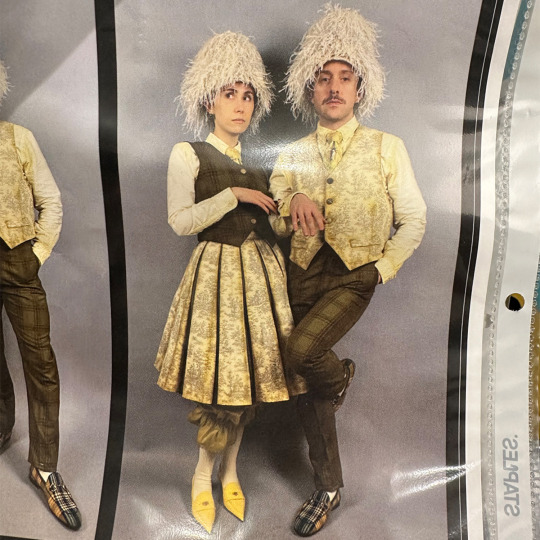
Jayden says he can't wait for fan fiction and edits of Charles and Edwin and says their ship name will likely be Chedwin. Mans don't know what he's asking for!
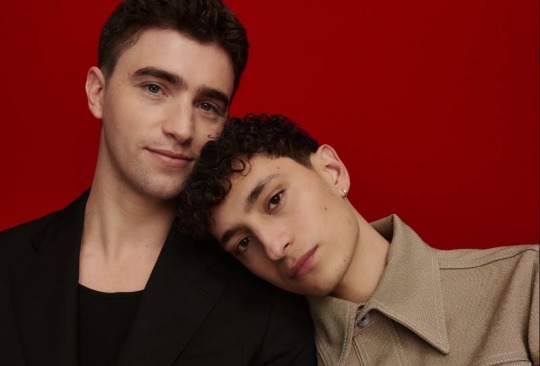
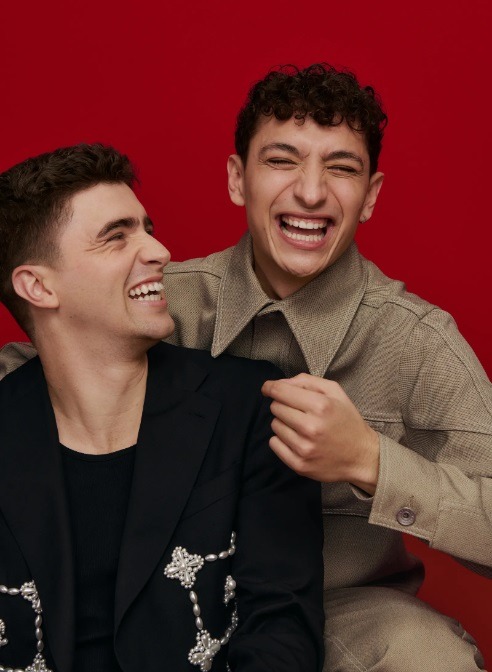
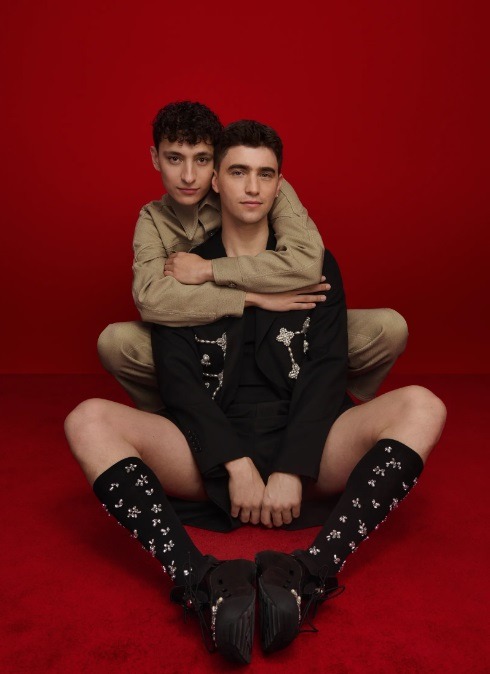

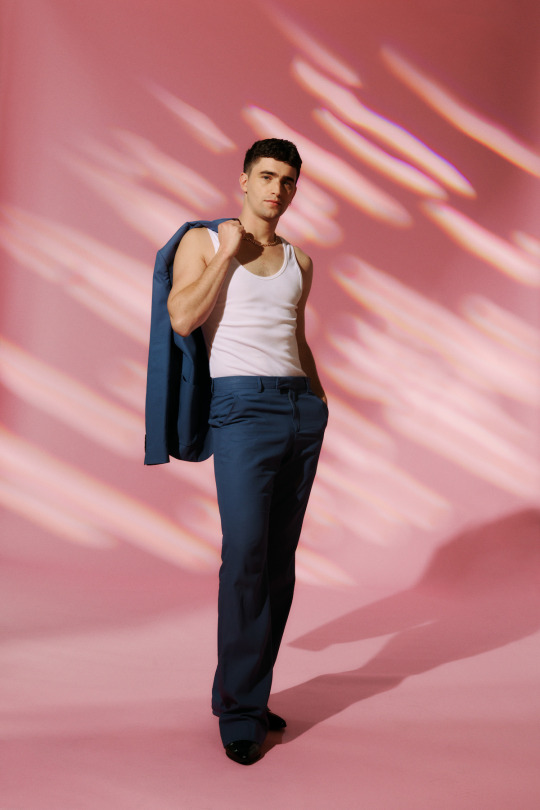


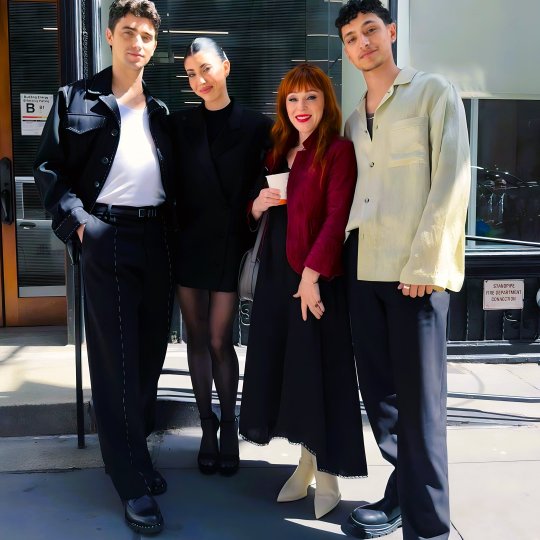
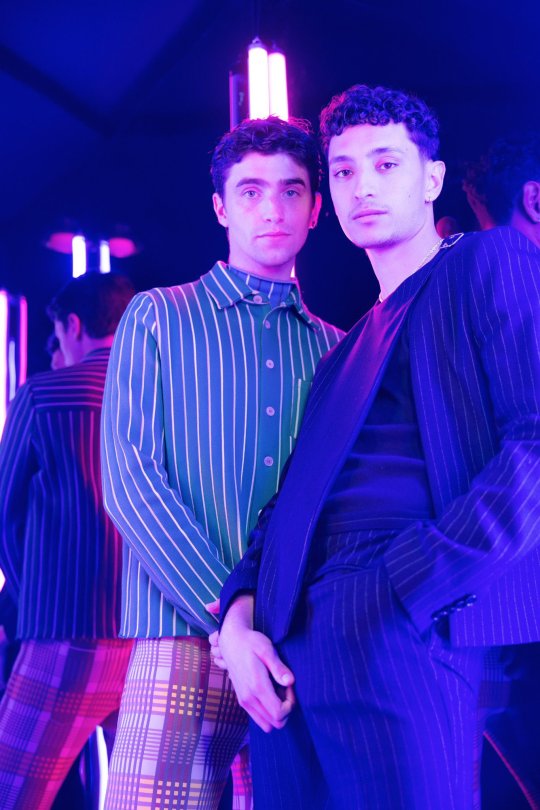
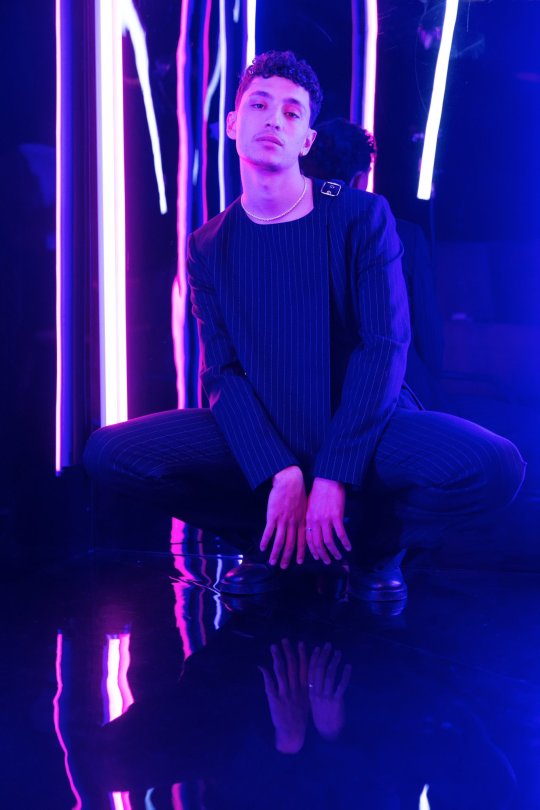
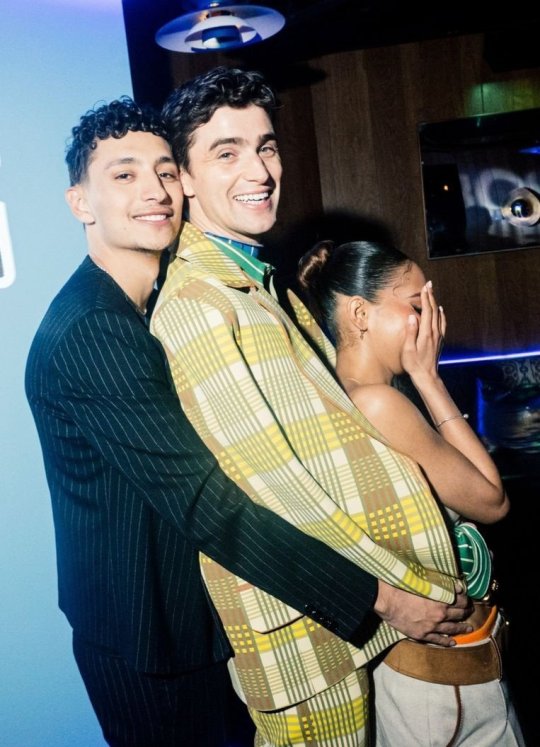
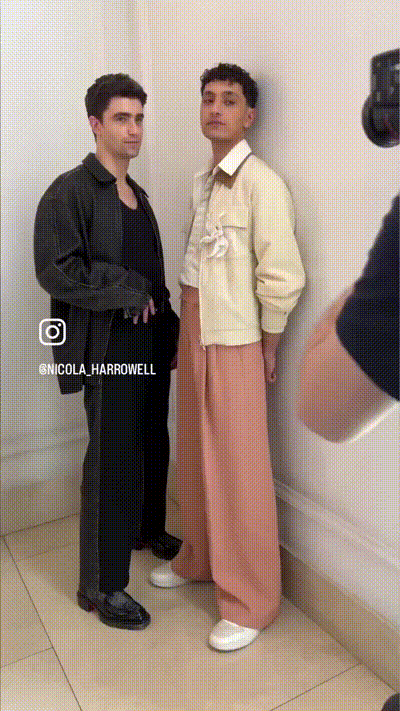
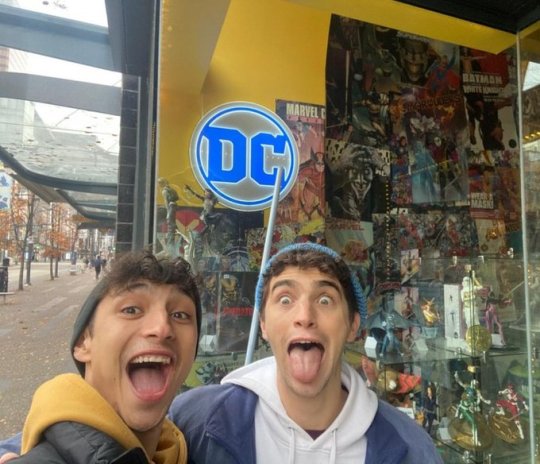
#dead boy detectives#dead boy detective agency#vertigo#sandman universe#george rexstrew#jayden revri#kassius nelson#yuyu kitamura#lukas gage#edwin payne#charles rowland#crystal palace#niko sasaki#briana cuoco#ruth connell#jenn lyon#comic book series#comic books#tv talk#cat king#dbd#dbd cast#dead boy detectives cast
131 notes
·
View notes
Text
Literary Hot Takes: My 100% Honest Opinions on Neil Gaiman's Writing Style Have Not Changed
So, with all the revelations about Neil Gaiman's disturbing private behavior in the last year, inevitably, a lot of readers and former fans will be saying that he was never really that good to begin with, or the red flags were there, etc. etc. and others will be saying he is an absolute literary treasure regardless of what he did.
But for what it's worth, my opinion on Neil Gaiman's actual writing has not really changed, and it is this:
Neil Gaiman has a delightfully witty and charming writing style, a remarkable ability to balance whimsy and terror perfectly, a great balance between self-aware literary fiction and delightfully genre camp, and clever ideas to spare. But the man cannot for the life of him write a compelling main character. Seriously, every single main character in his novels is either a blank slate (Coraline, Tristram) an obvious self-insert (Richard Mayhew) or both (Sandman). IMO his best work is Sandman (because the MC being a blank slate is kind of the point); the children's books Coraline and The Graveyard Book (because kids' books rely more on whimsy and wonder than detailed character psychology anyway); and the short stories (where taking a cool concept and running with it is kind of the point). It's also why adaptions of his work are often better and more successful than the original work: because the actors and screenwriters manage to turn Gaiman's protagonists into actual, y'know, characters.
Like, I think Gaiman's biggest accomplishment as an author was to make fantasy, science-fiction, and horror something that was not only mainstream but widely respected by the literary establishment. He is certainly not the talentless hack that is being painted by some detractors -- the guy can really write, and he won all those Hugos and Nebulas for a reason -- but at the same time, I think Gaiman's greatest achievement was not so much being a sci-fi and fantasy author as being a CELEBRITY sci-fi and fantasy author who majorly increased the cred of the genre.
The fact that his fame and recognizability, which were arguably his greatest contribution to his genre, were also his downfall and the environment that enabled his wrongdoings, is, I think, a paradox that is going to haunt his literary reputation forevermore.
#neil gaiman#neil gaiman allegations#literary hot takes#fantasy#sci fi#genre fiction#literary fiction#literary genre crossover#crossover fiction#coraline#sandman#stardust
30 notes
·
View notes
Text
I’m a bit shaken up still so I apologize for any imperfect wording in this. As someone who has dealt with SA multiple times previously and harassment from much older men who either don’t care about or understand consent, I’m deeply saddened by what I heard about Neil Gaiman today. I came to Good Omens from Terry’s work and both Good Omens and Discworld have changed my life for the better. I just got into The Sandman and really enjoyed it too. I’m always going to be a GO fan and I love the fandom. But I just hope based on the conversations I’ve been seeing that people understand that two things can be true at once…a terf did help put the information out there, but Neil also admitted to the relationships regardless which featured very large age gaps along with power imbalances. Neil has replied to a few of my asks and shared one of my posts (which was about how reading fiction and certain authors have helped my mental health so much) and I really enjoyed his presence on here, so I’m not saying any of that lightly. A lot of my MH conditions come from sexual trauma so this was very painful to see. There’s a good Reddit thread on his subreddit that goes more in depth with more context and allegations. I hope that the fandom can come together and heal from this and I also hope that we can all take a second before brushing allegations aside due to our love for an author and their work.
62 notes
·
View notes
Text
youtube
Don't let the title fool you. This isn't a video saying critiquing Harry Potter is wrong. In the wake of Neil Gaiman being outed as an abuser and rapist, I think it's important to have a conversation about our relationship to media, and how "well shitty author's works always sucked" isn't a healthy way of dealing with the fallout. It's a line of thinking that puts the onus on fans for getting invested in a story they had no way of knowing was made by a horrible person ahead of time. It should always have been that even if Harry Potter was good, or if you don't want to use that then insert Coraline or Sandman from Gaiman, we need to give those up because fiction isn't worth more than the victims of an abuser or bigot.
27 notes
·
View notes
Text

Been a fan since American Gods came out. After that I had to track down everything he wrote. I was 17, which is a wonderful age to get into weirder science fiction and fantasy.
Most celebrities (actors, politicians, etc.) I don’t much care for. I look to those that can inspire others with stories as people to look up to. Time and again I’d learn great writers had done terrible things or had horrid personal beliefs. HP Lovecraft (racism), Isaac Asimov (groper), John W. Campbell (also racism), Samuel R. Delaney (advocating for NAMBLA), Marion Zimmer Bradley (Chronic child abuser), and David Eddings (also abusing children).
There seems to be no shortage of great authors in speculative fiction that have/had controversy. So now I’m definitely going through another round of heartbreak as I had after Orson Scott Card, JK Rowling, etc.
As a fellow writer, it’s heartbreaking to also go forward not wanting to list him as one of my bigger influences.
I’m probably not going to get rid of my Sandman comics or other novels, but I know I’ll never buy another book/audiobook or watch another show/movie Neil is associated with after all of this.
I try to remember a Seneca quote when I find good books written by awful human beings.
“All good work is good for humanity, no matter the source.” I’m paraphrasing a little, I think, but it’s definitely a good reminder to separate good work from not so good people.
All the same, this one really stings for me. I wanted the allegations to be just that, but even the Neil Gaiman subreddit is collectively mourning the former adoration.
Shadow Moon and Mr. Wednesday would be very disappointed in you.
#why neil why#neil gaiman#neil gaimen allegations#sandman#coraline#good omens#stardust#the graveyard book#neverwhere#american gods#author controversies#rant post#tumblr writing community#tumblr writers#creative writing#writing#tumblr authors
25 notes
·
View notes
Text
A FUNERAL FOR NEIL-GAIMAN
My hyper fixated autistic mind keeps running the Neil-Gaiman allegations around and around in my head and I need to find a way to move past the hero in my mind. Even though I believed Neil-Gaiman when he said ‘you never want to meet your heroes’, even though I am old enough to know better, even though I assumed Neil-Gaiman probably had issues and hangups that didn’t come through in his friendly and wise public persona, I have still been hit hard by the extent that I was wrong. I need ritual, closure, a way to move on. So I WILL BE HOLDING A PRIVATE FUNERAL FOR MY HEAD-CANON NEIL-GAIMAN. Maybe others want to hold their own funerals, maybe it will help, and so I put this out there for you to consider.
To be clear - and many may disagree and I am fine with that - I do not care in theory if Neil slept with younger women, I slept with older men and think of myself as better for it. I do not care that Neil practices BDSM as long as it is safe and consensual. I do not care if Neil had an open marriage if it was agreed upon by both parties. I believe Neil is autistic, and that can make intimate (or really any) communication difficult sometimes, but I do not think that is an excuse. I believe Neil suffers depression and suicidal ideation, but I do not think that gives him a pass for treating others poorly.
I care that Neil took advantage of women who were at a disadvantage - financially, professionally, mentally, emotionally. I care that he was proposing sex with women after being married to his first wife for only a year and who was probably obliviously at home with their new baby. I care that Neil is no where near the man I thought he was, I hoped he was, I believed he was and that made the world a slightly better place.
So, I will be holding a funeral for Neil-Gaiman. For the man who spoke of his own heroes - Terry Pratchett and Gene Wolfe - as polite and kind and wise and (I made the mistake of assuming) as role-models for his own behavior. For the man who appeared to be so kind and funny, with no ulterior motives, on Tumblr to so many fans. For the man who has written the books that I have read and reread to get through various crises in my life and so I assumed he had a deeper wisdom than I about life. For the man that I had a serious crush on since the 1990s. For the man who inspired various aspects of my own writing about, and understanding of, humanity. This man is fictionally dead, because this man was a fiction. His art lives on, and I will continue to love the art because I can not simply turn that off.
What will this funeral be like? Probably some candles. Probably some tears. Probably burning a photo or two, but never never a book. Comfort food, definitely. Sad music. Maybe watch my favorite moments in Good Omens. Or read my favorite short story in Trigger Warnings. Or maybe just work my way through The Sandman again. I will grieve him like I grieve the end of a good book, or the death of a favorite character in a story, or the loss of a favorite place on the landscape.
The fact that there is some other dude out there that looks like Neil-Gaiman, who I think of as just Neil (because every ‘Neil’ I have known was an ass, which should have been a red flag really), is too bad. Maybe Neil is self-destructive, maybe Neil harms others to harm himself, maybe Neil will find help, find a way back from the depths he has thrown himself into. Or maybe Neil is just a dick; always has been, always will be. You can be autistic and self-loathing and depressive and suicidal and still be kind. But you can also be all of those things, and also just be a dick.
R.I.P. Neil-Gaiman. I am done. I have no more to say on this.
45 notes
·
View notes
Note
Hello Neil Gaiman!! I just finished The Shadow of the Torturer, by Gene Wolfe, and I was reading through the wikipedia page when I came across: "Neil Gaiman, in his list of the three greatest science fiction novels, ranked The Shadow of the Torturer first, ahead of Neuromancer and The Left Hand of Darkness." I just thought that was super cool! The whole first half of the book, I couldn't stop thinking about the Sandman comic at the World's End pub, where the man tells the story about the Necropolis. I actually wondered if you had ever read it. My (first) question is: was that a conscious inspiration, or did it just crop up like that unheeded? Also, I really loved The Left Hand of Darkness, and almost everything William Gibson does (weirdly enough I haven't gotten around to Neuromancer), and it is escaping me a bit how TSOTT gets the top spot. I loved the book, of course. There were bits every other chapter that forced me to stare at a wall for a while to think over, and the strange words that Wolfe uses are like a fun puzzle to figure out every time. The world building is incredible, and the influence it had on the genre and all that, but by the end, boy oh boy. I was struggling. It was mostly because of the 'romance' bits, which also made me stare at the wall for a while, but mostly to mentally recover. Anyway. I guess I am just generally wondering what factored into your decision-making, and why you loved The Shadow of the Torturer so much. I haven't met anyone else who has read it, as far as I know, and it seems shockingly under talked-about, so I am hungry for a second opinion. Thanks very much, Maya p.s. I'm a very big fan, been reading (or being read) your books since I was a toddler!
I'd put the Book of the New Sun ahead. Shadow of the Torturer is the first fifth of a book. You've got a way to go on the journey and it will repay rereading in a way that few other books do.
228 notes
·
View notes
Text
Call No Man A Hero While He Still Breathes
Yesterday, Vulture released a very well-written, and very damning, article about Neil Gaiman. I highly recommend you read it, though it has terribly disturbing information. If you aren’t aware, Neil Gaiman is an extremely popular fiction author; some of his works of note are Good Omens and the comic book Sandman, both of which have active series on Amazon and Netflix respectively. He’s known for his stories with darker worlds and tones, worlds where danger is very real and spares no one (many of his stories are written, or partially written, from the perspective of children having to confront a terrifying world). His stories are unique, empathetic, and well-written. He’s been considered a genre leader for years.
The article went into allegations that have come out in the last year of sexual assault and abuse. It started with a podcast that interviewed his accusers, and then other articles and podcasts followed. Of particular note was Gaiman’s silence when the allegations where first made, and then his responses of regret…not, one will note, of denial.
In the literary world, the fall of this leviathan has been particularly shocking because of the lack of allegations previously despite an active career since the eighties (though the allegations do reach back that far), and the fact that Gaiman has claimed to be a feminist, and is known for championing women.
Unfortunately, as any female can avow, it’s not just men who have “creep” tattooed on their foreheads who are dangerous. And it would appear Gaiman is just one of the millions of “wolves in sheep’s clothing” that prey on women in this world. I fully believe the accounts of the women, and find them absolutely horrific. He clearly uses his power and wealth to find women he can manipulate and hurt, and does so with apparent abandon.
I don’t want to get into the details here too much, but some high level overview includes:
Cheating on both of his wives, despite the second marriage even being open
Regularly finding extremely young fans at events and coercing them into sexual situations. This in itself doesn’t seem to bad on the surface, until you read about the type of sexual encounters that Neil seems to thrive on: Extremely sadistic sex without consent or safeguards, especially with those not used to a BDSM lifestyle. If you use sadism without constraints or consent, that is just abuse.
Abusing his positions of power to keep women in financial trouble in positions of weakness to be easily exploited (two of the women had agreements of employment with him, that he then ignored and abused, and willingly exploited their fears of him taking away their homes if they didn’t comply with painful sex that they said they did not want)
Fostering a self-deprecating and “safe” persona for women, which was a front to prey on them behind closed doors.
Committing abusive sexual acts to woman IN FRONT OF HIS CHILD, who was awake and aware. Ugh.
And that’s just the surface. To be clear, there’s one discussion to be had about consenting adults in positions of different power and what they want (for example, an older and wealthier famous person being with a very young and broke not famous person). But that isn’t the discussion appropriate for this situation. Specifically at play here is the abuse, and the fact that Gaiman essentially copped to it all by saying he had “regrets about his conduct”. But not a denial.
I’ve been a fan of Neil Gaiman’s work since the mid-nineties. I first read the Sandman comics, then bumped into Neverwhere on my school’s library shelves. I read the story of a different London and loved it. The bits of history that were referenced, the odd and quirky characters, the darkness with bits of light: I was immediately enraptured. I then read Good Omens, the apocalyptic comedy collaboration with Terry Pratchett, and got completely absorbed by American Gods when it was released a few years later. There were always uncomfortable scenes, but that was part of what drew me in. Life has dark parts that we can’t avoid or flinch away from, and I liked that Gaiman’s writing acknowledged that. Sometimes the endings were happy, sometimes neutral, sometimes…dark. And that reflected life to me, with a bit more magic and mystery thrown in. I don’t buy the idea that some are touting now, that we should have seen this all coming because he had dark scenes in his books. Artists are capable of projecting darkness without acting on it, I always have and will believe that. Unfortunately, some of them DO. And, Gaiman is apparently one of them.
As a woman, this whole situation is so frustrating to me. I’m no stranger to people that I look up to letting me down. By your forties, that’s happened a lot to everyone. There have been so many falls from grace. But the fact that Gaiman had made it through my entire adulthood unscathed, had given me a sense of relative ease to his behavior (although I’ve been a part of this world too long to ever completely believe that any rich, powerful, famous man is incapable of terrible things). I’ve met him at a book signing in Chicago when I was in college. He was kind and warm to me, and flirted lightly about my unique name. I took my signed book and went home, feeling good about the whole thing.
Now, in this case I’m seeing most people believe the women, but I do still see some of that doubt that comes out every time a woman accuses a famous and successful man of horrible things. It amazes me that so many seem to think there is some huge advantage for a woman to accuse a man of sexual assault. The conviction rates are incredibly low: less than 4% in the United States. There’s only a 50% chance that there will even be an arrest. And according to the National Sexual Violence Resource Center, somewhere between 2 and 10% of sexual assault claims are false. Here are more statistics from RAINN, and here from the National Sexual Violence Research Center. The public loves to side with the accused (I think I hear more about “Let’s wait to see if they get convicted, innocent until proven guilty” far more regarding sexual assault than I do for other crimes), despite the overwhelming odds that A: The guilty will be proven innocent statistically and B: The odds are overwhelming that the accuser is speaking the truth. It’s no wonder that most sexual assaults go unreported. The accuser will likely be doxxed, her name dragged through the mud, she will be labeled and disbelieved and, the added bonus now: Relentlessly bullied online for being a female who has accused a man of doing what terrible men have done throughout history.
Like all women, I have had my fair share of terrible, unwanted sexual and sexist encounters. There was the government boss who had a one on one meeting with me to discuss “the future direction of my project”. The project was classified so he asked me to close the door. When I closed and turned around, he was standing right there, and tried to corner me and kiss me. I was able to dodge him and leave the room. YES, that really happened. This was a charismatic man who was liked and didn’t seem sexist. He was married. I didn’t report it, because historically at the agency I worked at, reports of harassment were statistically overwhelmingly likely to end in the accuser being fired, the accused having no repercussions, and the accused’s name would be drug through the mud. I had bills to pay, so I just made sure to never be in a room alone with him again.
There was the team lead who intentionally wanted me to spend days doing high-powered radio frequency testing when I was pregnant. This would involve being a few feet away from the sorts of radar and radio devices used on aircraft carriers for hours every day. I said no, it would be too dangerous and could hurt my baby. He got angry and shouted in my face about it. This is the same man who later tried multiple times to intimidate and corner me in rooms alone when he didn’t like that I stood up for myself. I went to HR (never do that, kids), and they sided with him. I ended up leaving the entire project, which I loved.
Once, when walking in Chicago in the evening in winter, a random nicely dressed man started talking to me while we walked down the street near one another. He was commenting on nice restaurants in the area, and since I lived the next block over I gave him some advice. I enjoy chatting with people, and was content to just chat while we were on the same path. While waiting for a light to cross the street, he told me, “You know in this light, you remind me of my daughter.” I smiled and said thank you.
And then he grabbed my shoulders and tried to open mouthed kiss me. I shoved him away and called him a pervert, and went home and cried.
A man tried to drag me behind construction barriers when I was walking to the library when I was 19. He just grabbed me without a word from nowhere. I fought and got away.
A man who owned a comic book and gaming shop I went to as a teenager asked me if I “Was into married men” at 18. He was in his mid-forties. I’d felt safe after playing games with friends in his shop for months, and was there by myself. I laughed at him, and he said, “I’m serious.” I said, “Absolutely not, no thank you.” And left.
Honestly, these are the most PG stories I have of deplorable behavior. I have others, but I don’t want to share them online. I commend the women who are brave enough to do so. And every single one of these stories has a man who I’m sure has plenty of people who would say, “Oh he would never! He’s a good man. A family man/upstanding citizen/good dude/goes to church/nice guy!” And the moment those “good men” got to be alone with a woman that they thought they could treat any way they wanted, they did. Or they tried their best to.
The thing about predators is, they don’t show who they are to everyone. They don’t walk around town with a lear on their face, with a smirk and greasy hair. They don’t come across as sociopaths. They have a mask that they show to us. There are so many decent and good men out there, and the predators don’t go up to those guys and say, “Bro, if I could get that girl behind a dumpster I’d rape her, amirite?” Brock Turner, one of the more infamous rapists, who literally raped an unconscious woman behind a dumpster AND there were witnesses, got no jail sentence because the judge “didn’t want to ruin his life”. I’d argue that Brock Turner was the one who ruined his own life. But he appeared to be just a normal, preppy college student from a good family with a good future. They lurk among us, and know how to blend in and wait for the moment where they think they can get away with something. And they know the odds, and terrible to say, the world, are on their side a lot of the time.
We just elected a convicted sexual predator for President (again). As I write this, Pete Hegseth is being considered for SECDEF, despite convincing sexual assault allegations (and his own mother calling him a predator). At the moment, the public tide is turning in an anti-female wave on many levels. SCOTUS has stripped women of their body autonomy, and women have died from having miscarriages that they weren’t able to receive care for in places like Texas. Public perception and treatment of women is not at a great point. Mark Zuckerberg said he wanted “More masculine energy” at Meta last week, while Meta has a 2/3 male workforce. There’s a backlash currently in the public sphere against sexual equality. Part of that is because the more outrageous opinions get the attention, and our economy is in many ways attention-based these days. Part of it is because even the good men are tired of being painted with the “All men are bad” brush, which I think is a fair criticism. It’s absolutely true that not all men are bad; most of them are good, I do agree with that. But part of being the “good”, is making sure to call out and acknowledge the bad. And for so much of history, the “bad” have been able to act with impunity. I think maybe there was a bit of an overcompensation in recent years, where some people got so caught up in being able to finally acknowledge that they had a hammer of righteousness for the first time…and they unfortunately started to see all men as nails. We need to be careful to always recognize and support allies, and I’m not sure that it was kept in sight as much as it could have been. So now we have further tribalized again. The pendulum has swung a bit back the other way.
One of the hardest things to do is reconcile the people we think we know, with the other faces that those people don’t show us. We all do this to some degree, it’s part of living in society. I certainly don’t show the same aspect of my personality when doing a briefing at work, as I do to my children, or to my friends when discussing Star Wars or another hot button topic. But we need to remember that those masks can cover far more differences than interpretations of decorum, or what language is appropriate for current company. It can be a mask that covers horrors. And it’s our job to remember that you never truly know all parts of someone. At the same time, it’s important to remember that not ALL masks are covering monsters. Some of them are just covering regular human foibles, and that’s okay too. We need to remember that it’s not men vs women, right vs left, traditional vs progressive: It’s good vs evil. And the evil ones are the ones who hide their actions from the rest of us, because they know what they’re doing. And in this case, the mask that I’ve been following for years is one of my favorite authors. And now I have to reconcile the monster that he was hiding with what I thought I knew.
I won’t be purchasing anything else that gives money to Gaiman while he’s alive. I don’t want to support a living monster’s estate. I do still plan to watch Sandman and Good Omens when they come out, because those have an entire ecosystem of jobs that I want to support. However, I am not planning on getting rid of my books that he wrote either. I believe that artwork transcends the creator, and I don’t believe that the things I took away from his stories stopped existing because he’s not the person I thought he was. But I’m not going to continue to fund his means of exploitation either, and I won’t be recommending his work in the future. And I do support the women who came out against him, and I appreciate all the other authors and men and artists who have come out in support of the victims.
The world is hard and getting harder, for most of us. I don’t think that’s going to let up any time soon. But in the mean time, what we can do is remind ourselves that we are all here together. And in a world of polarization and hateful speech, which seeks to isolate and anger us for clicks and engagement (everyone types more when they’re mad! Everyone loves being told it’s not their fault, it’s the other guy’s!), let’s try to remember that most of us are here to try the best we can. Sometimes we fail, sometimes we succeed. But we need to listen to each other, even if the messages are hard. We need to find common ground, listen to the truth, and not surround ourselves with people just like ourselves. Men aren’t the problem; women aren’t the problem. Humans who wake up and choose evil are the problem, and the rest of us have to take uncomfortable steps to get ahead of them again. Maybe that means listening to someone who is saying a truth that hurts about someone you held in esteem. Maybe that means acknowledging that something about the world is not a good way to do things, even if it benefits you personally. And maybe that means acknowledging that simple answers may be attractive, but may not actually solve a complex problem in a country of 330 million, or a world of 8 billion. We just need to choose to move forward together, and make sure the company we keep is the “good” ones, as much as possible.
10 notes
·
View notes
Text
I always like looking at the sources and influences that shaped a work of fiction, especially books. Reconstructing these fictional chains is always a sort of pleasure for me.
And it comes quite handy in some cases - in this case, with Neil Gaiman's Stardust. I still love this work, I won't lie, and I still appreciate it in its various forms - be it the original comic book, the novella taken out of it, or the movie adapted out from it. However, given the allegations, accusations and denunciations that occured against the author, it makes complete sense for people to want to get away from this.
So, while I can't offer you works inspired by Stardust, I can give you the works that inspired Stardust! Because if there's one thing you can't blame Gaiman for, it is not being upfront with his sources and influences: he always pointed out which works, poems, documentaries, etc, etc, he used as inspiration and research for his work.
In the case of Stardust, Gaiman always very openly pointed out that the two main influences were Lud-in-the-Mist, and The King of Elfland's Daughter.


(Gaiman was in fact such a fan of Mirrlees' work that he was the one who prefaced its re-edition, after it went out of print for a VERY long time, only to get attention again through Gaiman's enthusiasm for it)
To these works of fiction, we must add the non-fiction book "Dictionary of Fairies" by Katharine Briggs, which was Gaiman's main resource and reference when it came to fairies - this dictionary did not only shape his Stardust, it also influenced his American Gods and also very likely his Sandman.

Also, not a direct source, but clealry something that Gaiman took after when trying to "pastiche" a fairytale world - in an interview with the Guardian about the upcoming release of Stardust (the movie), Gaiman describes how he discovered a fun trivia while reading the Penguin Book of English Folk Tales - how among the "oral fairytales" collected by British folklorists of the 20th century, there was a story that everybody thought was a genuine oral product... And it took them some time to discover it was actually a simplified and modified version of a literary story written for children by Lucy Clifford (I think it came from her "Anyhow Stories").


Not a fairytale, but a fun trivia. In the many footnotes for the French edition of Stardust, there are constant references to Pilgrim's Progress. The French edition clearly points out all the ways Gaiman reference or plays with the content of this work... But Gaiman himself, upon reading the footnotes, was not impressed or convinced. The translator clearly read way too much into this, apparently.

Seriously, while some of the French footnotes are interesting, others are completely OUT THERE. The translator (Frédérique Le Boucher, who wasn't the usual translator of Gaiman - normally it is Michel Pagel who does the translations) was so out of subject he literaly believes "Unseelie Court" is an invention of Gaiman, and that it means "Who Can't see the lie", "Un-See-Lie". Yeah...
There was an interesting article (you can read it here) that compared Stardust's style and content to the one of literary Victorian fairytales as a whole. The article claims that Stardust doesn't bear likeness to those of John Ruskin or William Makepeace Thackeray (The King of the Golden River ; The Roe and the Ring) but rather evokes those of Oscar Wilde and George MacDonald. The article defends that a good "companion" to Stardust is Maconald's "The Day Boy and Night Girl". Of course, the article also makes a point at comparing the graphic novel's original art with Arthur Rackham's style (which is an influence both Gaiman and Vess are very open about).

4 notes
·
View notes
Note
thank you for putting the harm neil gaiman has done over the love you had for his writing, its been really distressing to see so many people cry about how they love good omens and prioritize their own feelings, acting like their feelings about fictional characters matter more than the real harm he has done and how unsafe it is to allow him his continued fame, power, platform and accesses to people.
I fell in love with sandman, i have battered copies of both violent cases and black orchid, i used to love good omens [before falling out of the fandom] but the second i found out i got angry, i grieved the money i spent on the sandman comics [bc im broke af], and i recognized that the joy his works has ever brought anyone is nothing compared to the pain the women went through, with more and more coming forwards. its such a shame that's so hard for so many people to do
sorry that got away from me, but just to say thank you for being so reasonable about all of this, when i found out i ached for you because of all the love you have poured into sandman and death of the endless, and i think you should get the exclusive rights to death of the endless.
also fuck the people crying over a 90 minute movie i think good omens should have been removed from netflix <- petty over reaction but man why are good omens fans so annoying about the two shrodingers gay angels, get some better queer rep
hey, you don’t have to thank me. I really appreciate it though. I’m navigating this just like you and everyone else! I’ll be lying if I said the first few weeks didn’t leave me distressed and really, really confused. But I worked that shit out with my support system and my therapist…..I just hate how ppl are letting their personal feelings of hurt and disappointment cloud their priorities! We all reacted in our own individual ways, but those reactions should never take priority over our commitment to protecting women and supporting his victims.
I love sandman too. Pls don’t feel guilty over buying those books. I mean, I have a really extensive collection that I used my meager college paycheck to pay for, and I don’t feel guilty for having done it. They brought me joy! We’re allowed joy and to love our belongings. Hell, I’ll treasure my Absolute Death for the rest of my life- it’s my favorite book in my collection! We didn’t buy them to support him, we bought them bc they made us happy. It serves no one to self flagellate over that. There’s a huge difference between reading books we already own and petitioning Amazon to rehire him, trust me! You’re doing your best too and I commend you for that!
8 notes
·
View notes
Text
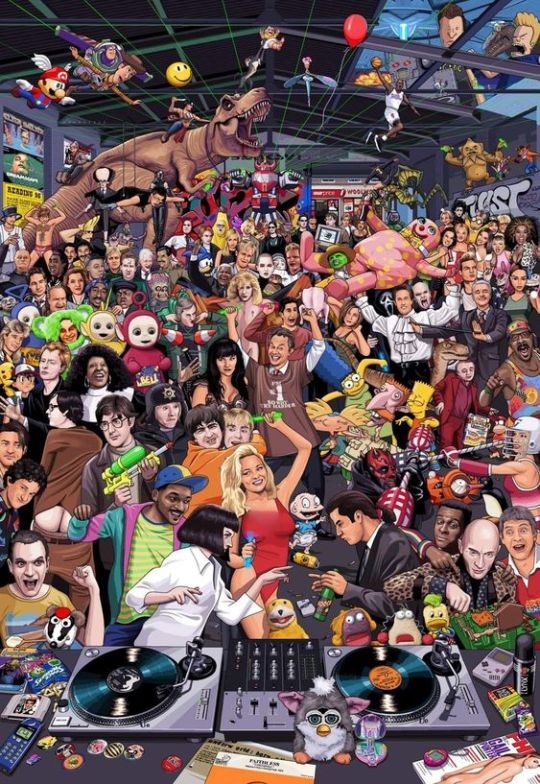
The 1990s was a pivotal decade for geek culture, solidifying many of the trends and franchises that continue to influence pop culture today. Here's an exploration of the various facets of geekdom in the 90s:
Video Games
The 1990s were a golden era for video games, seeing the rise of iconic franchises and gaming consoles.
Consoles and Games:
Super Nintendo Entertainment System (SNES) and Sega Genesis were at the forefront of the early 90s gaming scene. Classics like "The Legend of Zelda: A Link to the Past," "Super Mario World," and "Sonic the Hedgehog" became household names.
The mid-90s introduced the Sony PlayStation and the Nintendo 64. Games like "Final Fantasy VII," "Metal Gear Solid," "Super Mario 64," and "The Legend of Zelda: Ocarina of Time" revolutionized the industry with their storytelling and 3D graphics.
PC Gaming:
The rise of PC gaming brought titles like "Doom," "Quake," "Warcraft," and "Starcraft," which laid the groundwork for modern first-person shooters and real-time strategy games.
The introduction of the CD-ROM allowed for more complex and graphically intense games, expanding the possibilities of game design.
Comic Books and Graphic Novels
The 90s was a transformative period for comics, marked by a combination of innovation and market upheavals.
Marvel and DC Comics:
Marvel experienced a surge in popularity with the introduction of new characters like Deadpool and the significant events like the "X-Men's Age of Apocalypse" and "Spider-Man's Clone Saga."
DC Comics shook the world with storylines such as "The Death of Superman" and "Batman: Knightfall."
Independent Publishers:
The formation of Image Comics by former Marvel artists brought a wave of creator-owned series like "Spawn," "The Savage Dragon," and "WildC.A.T.s."
Vertigo, an imprint of DC, produced critically acclaimed titles such as "Sandman" by Neil Gaiman and "Preacher" by Garth Ennis, pushing the boundaries of mature storytelling in comics.
Science Fiction and Fantasy
The 90s were a golden age for science fiction and fantasy, both in literature and on screen.
Television:
"Star Trek" had a strong presence with "The Next Generation" continuing its success, followed by "Deep Space Nine" and "Voyager."
"The X-Files" became a cultural phenomenon, blending science fiction with horror and conspiracy theories.
"Buffy the Vampire Slayer" redefined the fantasy genre on television, combining teenage drama with supernatural elements.
Movies:
Blockbuster franchises like "Jurassic Park," "The Matrix," and "Men in Black" showcased cutting-edge special effects and imaginative storytelling.
The re-release of the original "Star Wars" trilogy in special editions prepared the groundwork for the much-anticipated prequel trilogy.
Anime and Manga
The 90s saw the global explosion of anime and manga, making Japanese pop culture a mainstream phenomenon.
Anime:
Series like "Dragon Ball Z," "Sailor Moon," and "Pokémon" became immensely popular worldwide, introducing many to the world of anime.
Films by Studio Ghibli, such as "Princess Mononoke" and "My Neighbor Totoro," received critical acclaim and international recognition.
Manga:
Manga series like "Naruto," "One Piece," and "Berserk" began their runs, setting the stage for long-lasting popularity.
The publication of "Shonen Jump" in English brought many of these series to Western audiences.
Role-Playing Games (RPGs)
The 90s were a significant decade for tabletop RPGs, with many classic games being developed and popularized.
Dungeons & Dragons:
The release of the second edition of Advanced Dungeons & Dragons (AD&D) in 1989 carried through the 90s, with campaigns like "Planescape" and "Dark Sun" becoming fan favorites.
Other RPGs:
"Vampire: The Masquerade" by White Wolf Publishing introduced the World of Darkness, a setting that offered a dark, gothic-punk alternative to traditional fantasy RPGs.
The cyberpunk genre was well represented by games like "Shadowrun" and "Cyberpunk 2020," capturing the gritty, high-tech, low-life aesthetic.
Collectibles and Trading Card Games
The 90s witnessed the birth and explosion of collectible card games (CCGs), with "Magic: The Gathering" leading the charge.
Magic: The Gathering:
Created by Richard Garfield and released by Wizards of the Coast in 1993, "Magic: The Gathering" became a groundbreaking and immensely popular game, sparking a new industry of collectible card games.
Pokémon:
The Pokémon Trading Card Game, released in 1996, quickly became a massive hit alongside the video games and TV series, contributing to the global Pokémon craze.
Internet and Technology
The rise of the internet in the 90s played a crucial role in shaping geek culture.
Early Internet Communities:
Bulletin board systems (BBS), forums, and newsgroups like Usenet allowed geeks to connect and share their interests in ways that were never before possible.
The creation of fan sites and the use of IRC (Internet Relay Chat) facilitated the growth of online communities dedicated to various fandoms.
Technology:
The proliferation of personal computers and the advent of the World Wide Web democratized access to information and entertainment, allowing geek culture to flourish and expand globally.
In conclusion, the 1990s were a transformative decade for geek culture, characterized by the rise of influential media, the advent of groundbreaking technology, and the growth of vibrant communities. The era laid the foundation for many of the trends and franchises that continue to shape geekdom today.
#90s tv shows#90s aesthetic#90s fashion#90s anime#90s music#90s nostalgia#1990s#vhs#nineties#90s movies
13 notes
·
View notes
Text
Huge fan of @neil-gaiman 's Sandman. Thought the concept of attributing a real life mystery illness barely anyone remembers nowadays to a fictional event was brilliant.
Well, I've been working on my family tree on an off for the last few years, and guess what? I just came across my great aunt's death certificate. She died at one and a half years, and the cause of death was encephalitis lethargica.
To recognize that illness because of the Sandman is so surreal.
Not to mention I had 80's synthwave music playing in the background when I came across it.
I don't know how to feel. Such a weird thing, to learn my great grandmother mourned a child that got taken away from due to an illness I read about in comics and thought of as "cool" in the most detached manner as possible.
14 notes
·
View notes